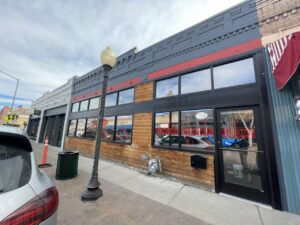By Miranda Ericksen
Although a cannabis retailer provided evidence of significant support for moving to 40th Avenue and Tennyson Street, the Denver Excise and Licenses director determined there are enough such businesses in the immediate area and has preliminarily denied the application.
Native Roots recently filed an application with the city to transfer its cannabis retail license from 1355 Santa Fe Drive to 4030 Tennyson St. Due to the finite number of business licenses available for recreational cannabis retail operations, it is common in the industry to apply for transfers of licenses from one location to another, rather than apply for entirely new licenses.

Excise and Licenses Director Molly Duplechian made the “recommended decision” recently to deny the application, and a final decision is likely to come this month. There are at least five cannabis dispensaries within a mile or so of the Tennyson Street business corridor between 38th and 46th avenues.
In the hearing, Native Roots provided evidence of 100 signatures in favor and 20 opposed to the transfer that were acquired from a paid petition they conducted of both residents and businesses along Tennyson Street.
Additionally, they entered into a Good Neighbor Agreement with Berkeley Regis United Neighbors (BRUN), committing to only doing business within their proposed hours of operation from 9 a.m. to midnight and disposing of any waste within city and state requirements.
Supporters present at the hearing included Jon Boord, CEO of Native Roots; three Native Roots employees; one Tennyson Street business owner; and one representative from BRUN. Supporters of the application said Native Roots has historically operated in compliance with the Marijuana Enforcement Division.
The desire for more diverse, walkable and unique small businesses was also stated as a reason why the license transfer application should be granted. They also cited the available parking along and near Tennyson Street, and said that adding a Native Roots location to the street would allow for this potential errand to be accomplished without the need for additional transportation.
To alleviate safety concerns regarding possible increases in crime, Native Roots intended to install 26 security cameras to monitor the interior and exterior of the space, but would not hire a security guard.
Erin Spies, director of compliance and regulatory affairs for Native Roots, said having a security guard on staff invites confrontation and escalation in a way that a receptionist doesn’t. A representative for Native Roots in the hearing could not be reached before press time.
Those in opposition specifically indicated issues with 4030 Tennyson’s proximity to Cesar Chavez Park. Although the park is a public recreation facility, it is not considered protected under state proximity laws associated with the location of cannabis or alcohol retail establishments.
According to the law, these establishments must be 1,000 feet or more away from schools, childcare facilities, alcohol and drug treatment facilities, and other licensed cannabis operations. Others in opposition stated their concern for the potential for increase in vehicle congestion due to double parking.
Residents and business owners on the street indicated that people will double park when they are intending to be inside an establishment for 10 minutes or less. In an independent petition conducted by Rebecca Alexander, a former attorney and current resident of the affected neighborhood, 27 fellow residents of the neighborhood indicated their opposition to the license transfer.
This petition was considered to be inadmissible in evidence, however, as the petition format was incorrect and only allowed signatories to indicate an “opposed” position. Alexander’s photographs and proximity measurements were allowed to be admitted into evidence, and the physical presence of those opposed to the license transfer were considered sufficient at the hearing.
City Councilwoman Amanda P. Sandoval, who was present at the hearing, said that she was “very happy with the outcome” of the recommended decision. She said that the hearing was not conducted fairly to her constituents as it was held at 9 a.m. on a weekday when most people are at work.
In a clarifying statement, Sandoval said, “If the intent of public hearings is to have public participation, we should be more thoughtful about making it possible for the public to participate.”
Sandoval explained that needs and desires hearings, all of which are specifically for granting or denying licenses for alcohol or cannabis retail establishments, are some of the most complicated to conduct fairly. She expressed gratitude for the constituents who worked alongside her on this issue.
“Community is all about coming together, and I am happy I was able to communicate in the hearing on behalf of my constituents,” Sandoval said.

Be the first to comment